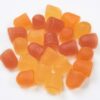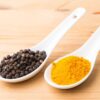
Scientifically perceived Curcuma Longa L. possesses three active phytochemicals, known as curcuminoids, collectively referred to as Curcumin, a bright orange flavonoid, well-regarded for its antioxidant properties. Turmeric, and its cousin ginger, are two of the world’s most popular herbal supplement ingredients. Occasionally, turmeric that you buy at the grocery store and that we use in cooking comes from the turmeric rhizome. They dry it and grind it up, making turmeric powder that you buy in the spice section at the grocery store. When you go to a store to buy turmeric as a dietary supplement, it comes in a pill form; it isn’t the dried rhizome in the pill. Instead, they take the dried rhizome; extract it with various chemicals to get a part of it. So one pill, one dietary supplement pill of turmeric, is usually equal to this much-dried powder. Turmeric supplements aren’t a treatment for diseases or chronic conditions, but the intrinsic medicinal quality of curcumin has provided numerous health benefits for humans. Hence, always visit a doctor to add turmeric supplements to your diet.
Why is turmeric good for inflammation?
Turmeric’s main active compound— curcumin — is what has anti-inflammatory properties, making it a promising treatment for various health conditions, including minimized chronic pain and joint mobility in patients suffering from osteoarthritis. One clinical trial found that taking turmeric extract three times a day was compared with taking a 1200-milligram dose of ibuprofen daily. However, more research is required to validate its effectiveness. Clinical research states that curcumin arrests enzymes and cytokines that cause inflammation. Here comes the capacity of curcumin as a treatment for RA.
Curcumin, an active chemical present in turmeric, decreases inflammation linked to:
- Inflammatory bowel disease (IBD)
- Diabetes
- Heart disease
- Cancer
INFLAMMATORY BOWEL DISEASE (IBD)
Curcumin is a bioactive chemical found in spice turmeric. It suggests a supplementary treatment for many health conditions, such as inflammatory bowel diseases (IBD). Curcumin has well-researched antioxidant and anti-inflammatory contents because IBD (Crohn’s disease, ulcerative colitis) are immune-linked issues that lead to inflammation of many digestive tract issues.
A study including around 700 healthy volunteers aimed to evaluate the impacts of turmeric on IBS symptoms.
Among these volunteers, one-tablet group and a two-tablet group.
Results:
- Between screening and baseline, IBS bulk decreased by 41 percent and 57 percent
- Between baseline and behind the treatment, there was a significant decline of 53 percent and 60 percent
- 22 percent-25 percent reduction in abdominal pain and discomfort
The research also found that two-thirds of all volunteers with IBS reported improved symptoms and underwent more good bowel routines.
EFFECTS OF CURCUMIN ON DIABETES
Curcumin can inhibit hyperglycemia, oxidative stress, and the inflammatory processes caused by Diabetes Mellitus. Furthermore, it acts as a stopper for the systemic complications of this disease, namely hypertension, dyslipidemia, neuropathy, nephropathy, and endothelial dysfunction.
Research offers that turmeric can:
- Lowers blood sugar level
- Improve insulin sensitivity
- Control weight gain
During clinical trials, curcumin:
- Slowed the development of type 2 diabetes
- Enhanced the function of beta cells
- Controlled the destruction of beta cells
- Improved insulin sensitivity
IMPACTS ON HEART INFLAMMATION
Chronic inflammation contributes to some common health conditions. When liver cells get damaged, inflammation occurs, leading to the liver’s improper functioning. Curcumin represses many molecules that play prominent roles in inflammation, but its absorption needs to be increased. Further, Turmeric supplements can help with liver inflammation. A plethora of studies suggests that curcumin can improve heart health and the functioning of the endothelium (the lining of your blood vessels). Thus, people consuming curcumin had a 65 percent decreased risk of experiencing a heart attack.
The present study indicates curcumin in Turmeric may stop the development of atherosclerosis, or clogged arteries-a critical threat for heart attacks and strokes.
The sole reason behind heart ailments is an accumulation of plaque. Plaque narrows the passage of blood flow to the heart, brain, and other body parts. Besides regulating blood pressure, turmeric helps take care of the damage caused by high blood pressure.
LDL (or bad) cholesterol gathers in arteries in the form of plaque in the walls of arteries. Curcumin prevents fat deposits in the arteries. Having high blood pressure in this state causes damage to tissues in arteries.
Curcumin in turmeric can help in preventing further damage caused to arteries because of high blood pressure.
EFFECTS ON CANCER-RELATED INFLAMMATION
Cancer is uncontrolled cell growth. Different cancer forms seem to be treated by Curcumin supplements. Furthermore, the latest research revealed that it could help kill cancer cells, reduce the growth of newly-born blood vessels in tumors, and minimize the spread of cancer. For effective and beneficial results, a high dosage of curcumin with piperine extract is yet to be studied for cancer patients. Gulping about 100 to 200 mg daily over long periods seems to work best in most cases. The clinical studies on curcumin consumption combined with chemotherapy drugs revealed that curcumin increases the efficacy of chemotherapy and radiotherapy, which results in improving patient survival duration and extending anti-metastatic proteins along with negating their side effects. (R)
HOW TO CONSUME TURMERIC
Too much anything is always dangerous. So always take turmeric in the recommended dosage.
Dry Root Form:
Take 1.5 to 2.5 grams per day.
Standardized Powder:
Take 1.2 to 1.8 grams per day.
Turmeric Tea:
You can use 15-20 grams of Turmeric root in 135ml of boiling water. You can repeat this twice daily.
Water-based Extract:
Use 30-80 drops of turmeric extract per day.
Ideal Turmeric Supplement:
If you’re looking for a turmeric curcumin supplement that is safe and healthy, click herehttps://amvital.com/shop/ to check out our store to get them delivered to your doorstep!
WHEN TO AVOID TURMERIC CURCUMIN
Curcumin supplements are safer and well-tolerated among most users. Turmeric side effects are pretty rare and mild. Here are fewer adverse reactions:
• An anticoagulant content in turmeric thins the blood.
• Turmeric can lower blood sugar. Therefore, Diabetic patients should use extra care while consuming it.
• The Arthritis Foundation advises taking turmeric supplements, i.e., capsules or gummies of 400-600 mg 3 times daily. One can take half to three grams of turmeric root powder daily. Turmeric’s excessive dosage results in digestive irritation.
• Generally, avoid turmeric before or after a scheduled surgery.
• FDA didn’t fix the amount of its dosing. Doses for osteoarthritis are generally less than 2000mg per day to avoid adverse side effects. In contrast, supplement manufacturers recommend a range of doses — usually from 500–2,000 milligrams (mg) per day.
FAQs
Does turmeric reduce inflammation in the body?
Let’s break it down further. Inflammation occurs in the body when the body’s defense system, i.e., the immune system, responds to invaders, irritants, and foreign objects entering your tissues and blood. Meanwhile, the visible symptoms may include redness, swelling, and discomfort.
Does turmeric work for Rheumatoid Arthritis (RA) symptoms?
Turmeric itself isn’t what suppresses inflammation; particularly, Curcumin is an active turmeric component responsible for acting against inflammation.
CITATIONS
Shehzad A, Rehman G, Lee YS. Curcumin in inflammatory diseases. https://pubmed.ncbi.nlm.nih.gov/23281076/ Biofactors. 2013 Jan-Feb
Hewlings SJ, Kalman DS. Curcumin: A Review of Its Effects on Human Health. https://www.ncbi.nlm.nih.gov/pmc/articles/PMC5664031/ Foods. 2017 Oct White CM, Pasupuleti V, Roman YM, Li Y, Hernandez AV. Oral turmeric/curcumin effects on inflammatory markers in chronic inflammatory diseases: A systematic review and meta-analysis of randomized controlled trials. https://pubmed.ncbi.nlm.nih.gov/31121255/ Pharmacol Res. 2019
Razavi BM, Ghasemzadeh Rahbardar M, Hosseinzadeh H. A review of therapeutic potentials of turmeric (Curcuma longa) and its active constituent, curcumin, on inflammatory disorders, pain, and their related patents. https://pubmed.ncbi.nlm.nih.gov/34312922/ Phytother Res. 2021
Peng Y, Ao M, Dong B, Jiang Y, Yu L, Chen Z, Hu C, Xu R. Anti-Inflammatory Effects of Curcumin in the Inflammatory Diseases: Status, Limitations and Countermeasures. https://pubmed.ncbi.nlm.nih.gov/34754179/
Faria FR, Gomes AC, Antunes A, Rezende KR, Pimentel GD, Oliveira CLP, Antunes BM, Lira FS, Aoki MS, Mota JF. Effects of turmeric extract supplementation on inflammation and muscle damage after a half-marathon race: a randomized, double-blind, placebo-controlled trial. https://pubmed.ncbi.nlm.nih.gov/32361773/
Taiba Tariq
Taiba Tariq is a healthcare nutrition hobbyist, enthusiastic about researching healthcare & skincare news while analyzing the latest and science-backed evidence about nutrition, skin care, and supplements. She wants to help people regain their beauty, health, and well-being through natural means.
all author posts




